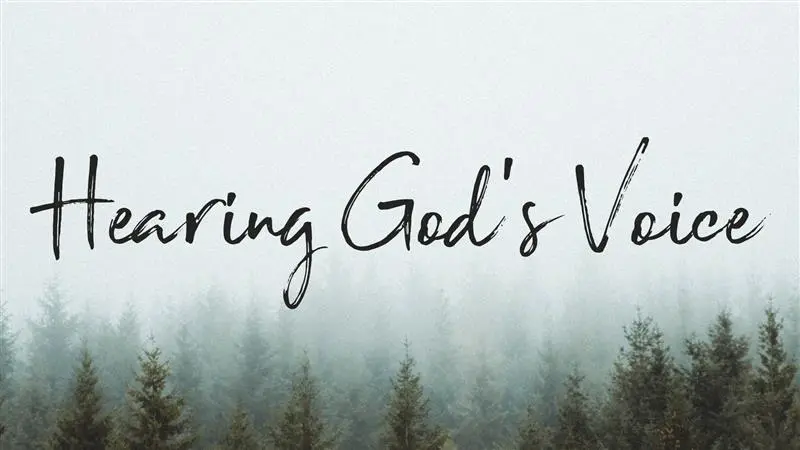THE SEED
”My sheep hear My voice, and I know them, and they follow Me…“ John 10:27-28
As children of God, it is one of our heritage to hear Him speak to us. We are serving a God who deals with us on a personal and relational level. He is our father and we are his children. Who is that child who doesn’t receive instructions from his father? No one. Hearing from our Father and taking to His instructions has no consideration with age, class, wealth, position, or post in the church, but with the heart that is prepared to hear, listen and act accordingly. A good example is the story of Eli and Samuel, there were other servants of God in the temple of God but God chose to speak with the small boy in the temple, whose heart pleased Him. The devil has no place, realizing he stands to gain nothing if everyone on earth has a good personal relationship with God, he brings in distractions of all sorts (sickness, hearsay, doubts, temptations) to distract us. We have to stand firm in our faith and the understanding and knowledge of our Father. To hear God speak to us, there are efforts we must make to make it a reality. We have to develop a relationship with God through prayer. It is our means of communicating with God. Also by always studying the scriptures and observing your quiet time, seeking Godly counsel and being active in worship. When you feel that you have not heard from God, pray and meditate on the scriptures, you will surely hear him speak to you.
BIBLE READINGS: 1 Samuel 3: 3-10
PRAYER: Lord, I want to hear you better and above hearsay. Teach me your ways, Lord. Amen
GBIGBO OGUN OLORUN
IRUGBIN NAA
“Àwọn àgùntàn mi ń gbo ohùn mi, èmi sì mọ̀ won, won sì ń tọ̀ mí leyìn…” Jòhánù 10:27-28
Gege bí ọmọ Ọlorun, ọ̀kan lára ogún wa ni láti gbo ohun re nígbà tí Ó ń bá wa sọ̀rọ̀. A n sin Ọlọrun kan ti o n bawa lo gege bi iha ti a ko si. Òun ni baba wa, àwa sì je ọmọ rẹ̀. Tani ọmọ ti ko gba ilana lati ọdọ baba rẹ? Ko si eni kan. Gbigbọ lati ọdọ Baba wa ati gbigbe si awọn itọnisọna Rẹ ko ni ero pẹlu ọjọ ori, kilasi, ọrọ, ipo, tabi ifiweranṣẹ ninu ile ijọsin, ṣugbọn pẹlu ọkan ti o mura lati gbọ, tẹtisi ati sise ni ibamu pelú re. Àpẹẹrẹ rere ni ìtàn Élì àti Sámúelì, àwọn ìránṣe Ọlorun mìíràn wà nínú tempìlì Ọlorun ṣùgbon Ọlorun yàn láti bá ọmọdékùnrin kékeré náà sọ̀rọ̀ nínú tempìlì, ẹni tí inú rẹ̀ dùn sí. Eṣu ko ni aaye, ni mimọ pe oun ko duro lati jere ohunkohun bi gbogbo eniyan lori ilẹ-aye ba ni ibasepo ti ara ẹni ti o dara pẹlu Ọlọrun, o mu awọn iyapa oniruru ọkàn wa (aisan, aeso, iyemeji, awọn idanwo) lati pinya wa. A ni lati duro ṣinṣin ninu igbagbọ wa ati oye ati imọ ti Baba wa.
Láti gbo tí Ọlorun ń bá wa sọ̀rọ̀, àwọn ìsapá kan wà tí a gbodọ̀ ṣe láti mú kí ó di òtíto. A ni lati ni idagbasoke ibasepọ pẹlu Ọlọrun nipasẹ adura. Ó je ọ̀nà tá a lè gbà bá Ọlorun sọ̀rọ̀. Pẹ̀lúpẹ̀lù, nípa kíkekọ̀o Ìwé Mímo nígbà gbogbo àti wíwo àkókò ìdáke je rẹ, wíwá ìmọ̀ràn Ọlorun àti jíjẹ́ aláápọn nínú ìjọsìn. Nigbati o ba lero pe iwọ ko ti gbọ lati ọdọ Ọlọrun, gbadura ati ṣe àṣàrò lori awọn iwe-mimọ, dajudaju iwọ yoo gbọ ti o ba ọ sọrọ.
BIBELI KIKA: 1 Sámúelì 3:3-10
ADURA: Oluwa, Mo fẹ lati gbọ daradara si. Kọ mi li ọna rẹ, Oluwa. Amin
